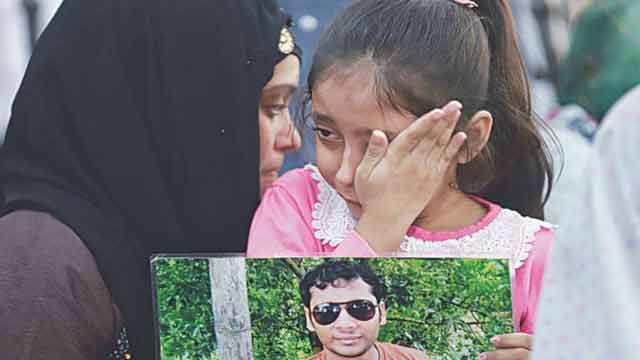The European Union has expressed concerns on the situation of human rights in Bangladesh, particularly about reports of “extrajudicial killings and enforced disappearances.”
During the ninth meeting of the joint commission of Bangladesh and the EU in Dhaka on Monday, the latter also reiterated its concerns on certain provisions in the Digital Security Act requested for ensuring freedom of expression.
In response, the Bangladesh side reiterated its “zero tolerance” policy to violations of laws and human rights by the law enforcement agencies, and the government’s commitment and continued efforts to ensure accountability,that included capacity building of the law enforcement agencies, a joint press release on the meeting said.
On the Digital Security Act, Dhaka committed to the EU that no provision of the act would be used in any way that would limit freedom of expression.
At the meeting, co-chaired by Md Ashadul Islam, senior secretary of Financial Institutions Division under the Ministry of Finance, and Paola Pampaloni, deputy managing director of the EU’s External Action Service, Dhaka and Brussels reviewed political developments on both sides, and discussed the role of democracy, the rule of law, good governance, and the importance of holding free and fair elections.
Both sides stressed the importance of ensuring full implementation of the International Covenant on Civil and Political Rights as well as the other UN human rights conventions ratified by Bangladesh, in line with the Constitution of Bangladesh.
The EU reiterated its political and financial support to the government and the people of Bangladesh in facing the Rohingya crisis, expressing yet again its appreciation for the generous and humane role and action by the host community.
-Dhaka, Brussels discuss importance of free, fair elections
-EU reiterates concerns on certain Digital Security Act provisions
-Both sides committed to pursue accountability mechanisms for the crimes committed against the Rohingyas
-Relocation of Rohingyas to Bhashan Char will be voluntary, Dhaka assures
-The bloc once again stressed the need for voluntary, safe, dignified and sustainable return of Rohingyas to Myanmar.
-Bangladesh expects continued support in this regard.
Both sides expressed commitment to pursue the accountability mechanisms for the crimes committed against the Rohingyas in Myanmar through various multilateral initiatives.
The plan for relocation of the Rohingyas to Bhashan Char was discussed, and the Bangladesh side reassured the EU of the voluntary nature of the relocation and engagement with the international community.
It is crucial for stability, economic growth and development to promote and protect the human rights of all, regardless of ethnicity, age, gender identity, sexual orientation, religious or political affiliation, disability or socio-economic background, the joint statement said.
Bangladesh and the EU welcomed the fact that the development cooperation of the bloc and its members with Dhaka currently amounts to more than Tk5,000 crore – €541 million – per year.
They launched discussions on the key priorities for the post-2020 cooperation agenda, also taking into account the government's upcoming 8th five-year plan.
The joint commission agreed on the importance of a regular sectoral policy dialogue to accompany long-term reforms, and to reinforce the EU-Bangladesh partnership for development cooperation in particular in the areas of climate change, social protection, human capital and good governance.
Dhaka and Brussels agreed to continue working jointly towards the implementation of the Sustainable Development Goals and within a wider framework, which should include other key international partners and the private sector.
The two sides also focused on jointly identifying opportunities for supporting investment, including key environment and climate change resilient infrastructure.
They also agreed that the good economic progress and the future graduation from least developed country status should give the opportunity to share the benefits of this progress with the poorer and the most vulnerable part of the population.
The joint commission meeting discussed the progress on joint commitments in the context of the EU-Bangladesh standard operating procedures for the identification and return of persons without authorization to stay, and agreed to further enhance cooperation in this area.





